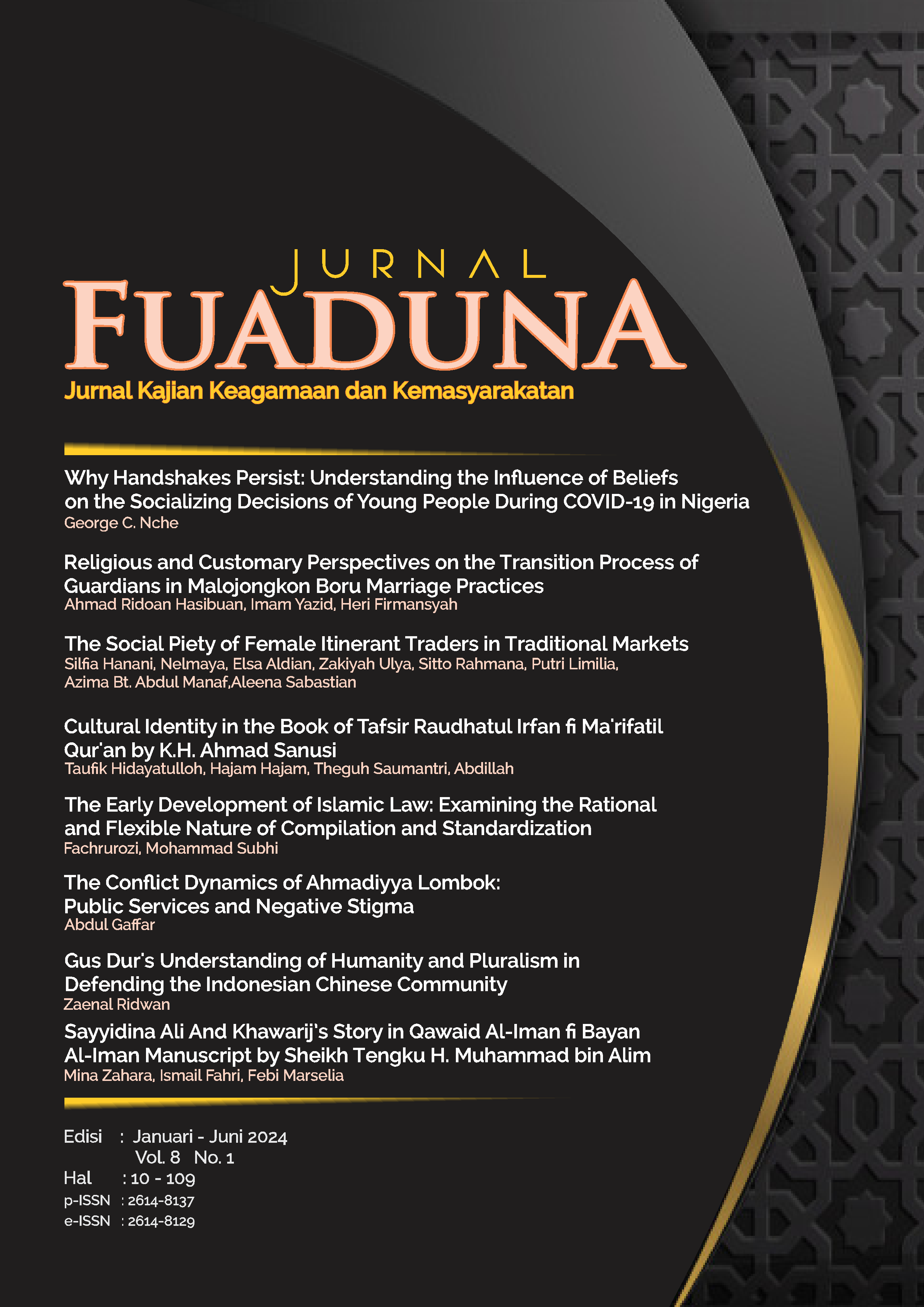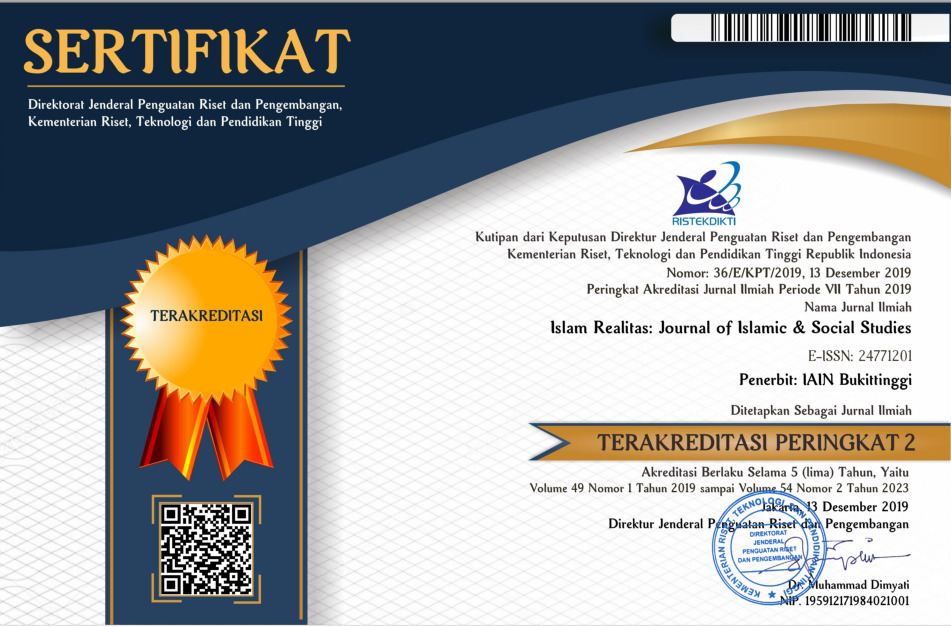Revitalization of Self-Identity of the Penelando Islamic Indigenous Community Amidst Global Cultural Change in Sasak Community
DOI:
https://doi.org/10.30983/fuaduna.v8i2.9149Keywords:
Penelando Islamic Indigenous Community, Revitalization of Self-Identity, Globalization, Sasak Community, Cultural IdentityAbstract
This study aims to examine the revitalization of self-identity within the Penelando Islamic indigenous community of the Sasak people in response to global cultural change. As globalization intensifies, indigenous communities face increasing challenges in preserving their cultural and religious identity while adapting to external influences. The Penelando community represents a unique case of cultural resilience, where tradition and modernity intersect. Using a qualitative descriptive approach with a sociological perspective, this research collects data through in-depth interviews with community members and stakeholders, as well as a literature review of relevant books and journal articles. The findings indicate that the Penelando Islamic indigenous community embodies an acculturative cultural-religious identity, reflected in their adaptive strategies, such as integrating modern agricultural practices with traditional belief systems. Traditional stakeholders play a critical role in maintaining communal identity by negotiating cultural continuity and change. Their accommodative stance allows them to selectively adopt global elements while preserving core values. This study contributes to the discourse on indigenous identity preservation by highlighting the dynamic interplay between local traditions and global influences. Further research is needed to explore similar adaptive strategies among other indigenous communities facing globalization, particularly in regions experiencing rapid socio-cultural transformation.
References
Alkaf, M., Purwasito, A., Murtana, I. N., & ... (2021). Nyuwun Slamet; Local Wisdom of Javanese Rural People in Dealing With Covid-19 Pandemic Through Request in Slametan Rite. … : International Journal of …, IV(2), 134–143.
Azizy, A. Q. A. (2004). Melawan Globalisasi: Reinterpretasi Ajaran Islam Persiapan SDM dan Terciptanya Masyarakat Madani (4th ed.). Pustaka Pelajar.
Campbell, H., & Teusner, P. E. (2011). Religious Authority in the Age of the Internet. Virtual Lives, 59–68.
Dalil, F., & Rahardjo, T. (2019). peran sesepuh adat dan media komunitas masyarakat kasepuhan ciptagelar dalam menjaga identitas kebudayaan asli. Interaksi Online, 7(3).
Djaya, A. K. (2012). Teori-teori Modernitas dan Globalisasi melihat modernitas cair, neoliberalisme, serta berbagai bentuk modernitas Mutakhir. Kreasi Wacana.
Fadly, M. A. (2008). Islam Lokal: Akulturasi Isalm Di Bumi Sasak. STAIIQH Press.
Ilhami, H. (2021). TELAAH DAMPAK NILAI-NILAI SUFISME DAN SOSIOLOGIS DALAM TRADISI BEQEN SEBAGAI KONSTRUKSI SOSIAL MASYARAKAT DESA PENE KECAMATAN JEROWARU. TASAMUH, 19(2), 181–196. https://doi.org/10.20414/TASAMUH.V19I2.4480
Jadid Al Idrus, S. A. (2020). Pene Lando Tradition : Islamic Syncretism and Local Culture in the Penne Jerowaru Village East of Lombok. 3(1), 111–128. https://doi.org/10.20414/sangkep.v2i2.p-ISSN
Majid, N. (1995). Islam: Agama Kemanusiaan. Paramadina.
Moelong, L. (2011). Metode Penelitian Kualitatif. Remaja Rosda Karya.
Nurohman, T., & Gunawan, H. (2019). Konstruksi Identitas Nasional Pada Masyarakat Adat: (Studi Kasus Di Kampung Naga Desa Neglasari Kecamatan Salawu Kabupaten Tasikmalaya). Journal of Politics and Policy, 125–154. https://doi.org/10.21776/ub.jppol.2019.001.02.3
Proyogi, A. (2016). dinamika identitas budaya melayu dalam tinjauan arkeo-antropologis. Tamaddun: Jurnal Kebudayaan Dan Sastra Islam, 16(1).
Rozi, S., & Taufik, Z. (2020). Adaptation of Religion and Local Wisdom in Global Environmental Issues in Indonesia. Religious: Jurnal Studi Agama-Agama Dan Lintas Budaya, 4(3), 191–203. https://doi.org/10.15575/rjsalb.v4i3.9593
Rudy, T. M. (2003). Hubungan Internasional Kontemporer dan Masalah-masalah Global: Isu, Konsep, Teori & Paradigma. Refika Aditama.
Ruhulessin, C. T. (2020). Fi Ra Wali: Revitalisasi Folklor “Saguku Hidupku” Sebagai Identitas Kultural dalam Kosmologi Masyarakat Sentani-Papua. Jurnal Filsafat, 30(2), 181. https://doi.org/10.22146/jf.54207
Rumahuru, Y. Z. (2018). Ritual Sebagai Media Konstruksi Identitas: Suatu Perspektif Teoritesi. Dialektika: Jurnal Pemikiran Islam Dan Ilmu Sosial, 11(1).
Salehudin, A. (2018). Revitalisasi Identitas Diri Komunitas Masjid Saka Tunggal Banyumas, Masjid Raya Al Fatah Ambon, dan Masjid Agung Jami’ Singaraja Bali dalam Perubahan Budaya Global. Religió: Jurnal Studi Agama-Agama, 8(1), 1–28. https://doi.org/10.15642/religio.v8i1.746
Saragih, H. (2018). DINAMIKA IDENTITAS ETNIS SIMALUNGUN DAN PEMBANGUNAN DI KOTA PEMATANG SIANTAR. ETNOHISTORI: Jurnal Ilmiah Kebudayaan Dan Kesejarahan, 5(2), 185–196. https://doi.org/10.33387/ETNOHISTORI.V5I2.1325
Soekanto, S. (2002). Sosiologi Suatu Pengantar. RajaGrafindo Persada.
Sulistyati, M. (2022). Otoritas Keislaman di Indonesia: Sebuah Pembacaan Ulang. Studia Islamika, 29(1), 189–203. https://doi.org/10.36712/sdi.v29i1.24649
Suprian J, I. (2015). Dakwah Kultural Perspektif Dialog Antar Budaya. Insan Madani Publishing.
Wahyudin, D. (2018). Identitas Orang Sasak: Studi Epistemologis terhadap Mekanisme Produksi Pengetahuan Masyarakat Suku Sasak. JURNAL PENELITIAN KEISLAMAN, 14(1), 52–63. https://doi.org/10.20414/jpk.v14i1.493
Wati, D. T. (2023). The Contriibution of Kyai Haji Agus Salim’s Thinking in Islamic Education. Al-Mujaddid: Jurnal Ilmu-Ilmu Agama, 5(1), 1–11. https://doi.org/https://doi.org/10.51482/almujaddid.v5i1.77
Wimra, Z. (2020). Keterlibatan Tuanku dalam Pergesekan Identitas Adat, Agama, dan Negara di Minangkabau. Analisis: Jurnal Studi Keislaman, 20(1), 69–94. https://doi.org/10.24042/ajsk.v20i1.6571
Downloads
Published
How to Cite
Issue
Section
Citation Check
License
Copyright (c) 2024 Asep Achmad Hidayat, Fajar Rohandy, Hablun Ilhami

This work is licensed under a Creative Commons Attribution-ShareAlike 4.0 International License.
Authors who publish with this journal agree to the following terms:
- Authors retain copyright and grant the journal right of first publication with the work simultaneously licensed under a Creative Commons Attribution-ShareAlike 4.0. that allows others to share the work with an acknowledgment of the work's authorship and initial publication in this journal.
- Authors are able to enter into separate, additional contractual arrangements for the non-exclusive distribution of the journal's published version of the work (e.g., post it to an institutional repository or publish it in a book), with an acknowledgment of its initial publication in this journal.
- Authors are permitted and encouraged to post their work online (e.g., in institutional repositories or on their website) prior to and during the submission process, as it can lead to productive exchanges, as well as earlier and greater citation of published work (See The Effect of Open Access).





